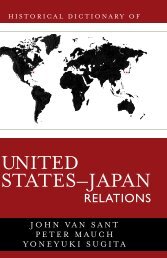Private Academies of Chinese Learning in Meiji Japan: The Decline ...
Private Academies of Chinese Learning in Meiji Japan: The Decline ...
Private Academies of Chinese Learning in Meiji Japan: The Decline ...
Create successful ePaper yourself
Turn your PDF publications into a flip-book with our unique Google optimized e-Paper software.
LIFE AT THE JUKU 127<strong>The</strong> transformation <strong>of</strong> education dur<strong>in</strong>g the <strong>Meiji</strong> period mayhave caused some teachers <strong>of</strong> kangaku to reflect on their positionas they felt themselves pushed <strong>in</strong>to the defensive. MishimaChūshū’s programmatic statement for Nishō gakusha <strong>in</strong>cludes acareful justification for the different branches <strong>of</strong> kangaku taught athis juku. Ikeda Sōan composed a memorandum lament<strong>in</strong>g the<strong>in</strong>creas<strong>in</strong>g regulation <strong>of</strong> juku <strong>in</strong> 1873.Ikeda Sōan left us more records on his thoughts about teach<strong>in</strong>gthan most juku masters, but speculation about the theory <strong>of</strong>education does not seem to have preoccupied the masters a greatdeal, at least not apart from their general philosophy. Just asthere was no separation between study<strong>in</strong>g and liv<strong>in</strong>g together, sopedagogy was not a specialized field apart from life as a whole.<strong>The</strong> relationship between a jukushu and those that enteredthrough his “gate” (monj<strong>in</strong> or monkasei) was <strong>in</strong> its ideal form “adaily, lived association”, ak<strong>in</strong> to that found <strong>in</strong> the master-discipletradtion <strong>in</strong> Eastern religions and to a lesser degree <strong>in</strong> the system<strong>of</strong> apprenticeship <strong>in</strong> pre-modern Europe. 31 <strong>The</strong> personality <strong>of</strong> themaster rather than his theories and methods was what made itsimpression on the students and what they remembered him for.<strong>The</strong> close relationship between master and student is perceivedas one <strong>of</strong> the most outstand<strong>in</strong>g characteristics <strong>of</strong> the juku(Chapter 6). And yet, here too there must have been considerablevariations. If the master was <strong>of</strong>ten absent or otherwise engaged,if the students came from a long way <strong>of</strong>f and did not stay long,how close was the relationship really? On the other end <strong>of</strong> thescale we have the local master who knew not only the studentsbut also their families, possibly because elder brothers, fathersand uncles had also studied with him. In such a sett<strong>in</strong>gYamamura Benzai could advise the father <strong>of</strong> Inagaki Saburō thathis son was more suited to the army than to follow <strong>in</strong> his father’sfootsteps as a physician, or tell the father <strong>of</strong> his most gifted daypupil, Okamura Gentarō, that he should be allowed to cont<strong>in</strong>ue hisstudies even if he was expected to learn a trade. 32Some masters are reported to have taken an <strong>in</strong>terest <strong>in</strong> theirstudents long after they had left. Yamada Hōkoku spent much <strong>of</strong>his last years travell<strong>in</strong>g to lecture at schools his pupils were<strong>in</strong>volved with. <strong>The</strong>y <strong>in</strong>cluded Meish<strong>in</strong>kan, established by one <strong>of</strong>his students with the support <strong>of</strong> Tsuyama doma<strong>in</strong> <strong>in</strong> 1870,Chihonkan, established <strong>in</strong> 1872 or 1873, 33 Onchikan, established<strong>in</strong> 1874, and Chish<strong>in</strong>kan, established around 1870. When he died,a few <strong>of</strong> his students strove to preserve his memory by













